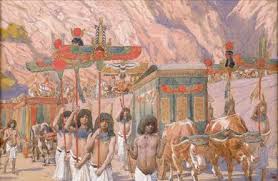So Joseph Went Up to Bury His Father
50: 4-14
So Joseph went up to bury his father DIG: Why such details concerning the funeral? Why such a large company of mourners? What does this have to say about the importance of Jacob? Of Joseph?
REFLECT: How do you feel about the whole subject of death and dying? Is it something that you can talk about, or is it something you avoid? Why?
Joseph was faithful to the last, burying his father with great pomp and ceremony in the patriarchal tomb in the land of Promise.811 When the seventy days of mourning had passed, Yosef and his brothers were determined to follow through with their pledge to bury him in Canaan. But this was easier said than done. Even though the famine had ceased, the Israelites had become very important to the Egyptian economy. Yosef, especially, was judged indispensable by Pharaoh and there might have been some real resistance to his leaving.
As a result, Joseph very diplomatically first gained the support of Pharaoh’s court for his request, and then asked them to speak to Pharaoh on his behalf. He assured them that the Israelites would all return after the burial. He also appealed to their strong sense of respect for the dead by pointing out that his father had made them swear a solemn oath to bury him where his ancestors were buried.812 Pharaoh could see that Yosef was sincere and said to him, “Go up and bury your father, as he made you swear to do” (50:4-6). Pharaoh’s words do not end with, “and then come back to me,” because Joseph had said he would. This is another indication of his unspoken trust in Joseph’s truthfulness.813

So Yosef went up to bury his father, but he did not go alone. All Pharaoh’s officials accompanied him – the dignitaries of his court and all the dignitaries of Egypt – besides all the members of Joseph’s household and his eleven brothers and those belonging to his father’s household. The accompaniment by Egyptian dignitaries and a military escort reflect the importance of Joseph and the dignity that is thereby accorded to Jacob. It also served a theological purpose, showing how far this little family of Abraham’s had come. God promised to make them a great nation and bless them. Now all of Egypt stopped and paid attention to the passing of Abraham’s grandson.814 Only their children and their flocks and herds were left in Goshen, a fact that assured any skeptical Egyptian that they would indeed return (50:7-8).
A military escort of chariots and horsemen also went up with him for his protection. It ended up being a very large company (50:9). The funeral march did not take the normal route from Egypt to Canaan, but, for some unknown reason, it took a detour and traveled around the Dead Sea and up the east side of the Jordan River.815
On the way to the burial site in Hebron, the funeral procession stopped when they reached the threshing floor of Atad,on the east side of the Jordan. There they lamented loudly and bitterly; and there Yosef observed a seven-day period of mourning for his father (50:10).
Even the Canaanites were impressed by the great sorrow expressed there. When they saw the mourning at the threshing floor of Atad, they said to one another: The Egyptians are holding a solemn ceremony of mourning. That is why the place near the Jordan is called Abel Mizraim (50:11). In Hebrew the word for mourning is aveil, and it translates into English as Abel (with Mizraim being the Hebrew word for Egypt). The Canaanites realized that it was very unusual for dignitaries from Pharaoh’s court to come to Canaan, so they gave it the unusual name, the mourning of Egypt, or Abel Mizraim.
So Jacob’s sons did as he had commanded them. They carried him across the Jordan to the land of Canaan and buried him in the cave in the field of Machpelah, near Mamre, which Abraham had bought as a burial place from Ephron the Hittite, along with the field (50:12-13). There they buried him, as he had commanded, giving testimony not only to the love of their father, but also to their faith in the LORD’s promises concerning the Land, which someday would go to their descendants as an everlasting possession.816
After burying his father, Yosef finally returned to Egypt, together with his brothers and all the others who had gone with him to bury his father (50:14). God had led them into Egypt, and it would be up to Him to lead them out again. They probably realized that they would be there for a long time. ADONAI had said that their descendants would be strangers in a country not their own, and they would be enslaved and mistreated for four hundred years. It would not be until the fourth generation that their descendants would go back to the Promised Land (15:13-16).



Leave A Comment